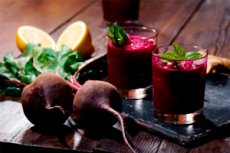New publications
Beet juice before exercise improves fitness outcomes in late postmenopausal women
Last reviewed: 02.07.2025

All iLive content is medically reviewed or fact checked to ensure as much factual accuracy as possible.
We have strict sourcing guidelines and only link to reputable media sites, academic research institutions and, whenever possible, medically peer reviewed studies. Note that the numbers in parentheses ([1], [2], etc.) are clickable links to these studies.
If you feel that any of our content is inaccurate, out-of-date, or otherwise questionable, please select it and press Ctrl + Enter.

Drinking beetroot juice before exercise may enhance the benefits of exercise in postmenopausal women, according to a new study. The findings are published in the American Journal of Physiology-Regulatory, Integrative and Comparative Physiology.
As we age, decreased mobility can lead to a dangerous chain reaction that increases the risk of falls, physical inactivity, and dependence on others. In some cases, it can even lead to premature death. Although exercise is the most effective way to combat age-related decline in physical function, women who are late postmenopausal—that is, six years or more after their last period—often have a harder time building strength and improving their fitness compared to men and women of the same age who are not yet postmenopausal.
Reduced availability of nitric oxide may reduce the reactivity of skeletal muscle and blood vessels during exercise, which may explain why late postmenopausal women respond differently to exercise. To address these concerns, the researchers examined whether beetroot juice, which is rich in dietary nitrate, could enhance the benefits of exercise in late postmenopausal women. Nitrate is stored in limited amounts in skeletal muscle and is converted to nitric oxide during exercise.
The study involved 24 postmenopausal women who performed supervised circuit training three times a week for eight weeks. Half of the participants drank 140 milliliters (about half a glass) of beetroot juice two to three hours before each workout. Before and after the training period, all participants completed fitness tests, including a six-minute walk test and a maximum knee extensor strength test.
Participants who drank beetroot juice before exercise showed greater improvements in several aspects of physical function, such as aerobic endurance and recovery, compared to those who did not drink beetroot juice. Specifically, participants who drank beetroot juice increased their six-minute run distance by 40 meters, while the group who did not drink the juice improved by only eight meters.
These improvements were reflected in a 1.5 milliliter per kilogram per minute increase in aerobic endurance in those drinking beetroot juice, compared with an increase of just 0.3 milliliter per kilogram per minute in the group that exercised without the juice. Heart rate recovery was also improved: Participants drinking beetroot juice had a 10-beat-per-minute decrease in heart rate after a six-minute walk test, compared with just one beat per minute in the no-juice group.
According to the researchers, the study results provide strong preliminary evidence that drinking beetroot juice before exercise may be particularly beneficial for late postmenopausal women. These findings may facilitate the development of new, targeted, non-pharmacological interventions to maintain independent mobility and quality of life in this population.
